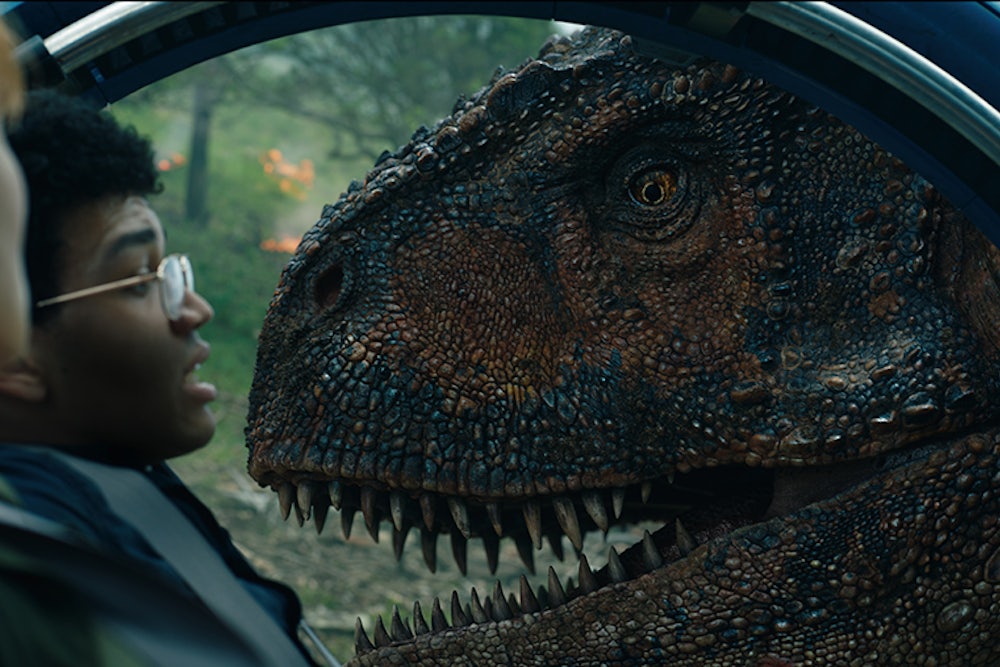The first thing to know is that the island explodes. In Jurassic World, the 2015 revival of the beloved dino franchise, a new luxury theme park opened in the Caribbean called Isla Nublar. Nublar got ravaged by dinosaurs, of course, because every Jurassic picture is about things being ravaged by dinosaurs. The new movie, Jurassic World: Fallen Kingdom, is set in the same spot. The dinosaurs are now roaming a ruined island. But worse is on the way, since Nublar’s dormant volcano has ceased to be dormant.
Exploding the island is the sort of symbolic move that also contains a great deal of cinematic potential. Volcanoes are a callback to the extinction event that killed off dinosaurs in the first place, but they are also a plot device that requires that the dinosaurs be relocated. Sir Benjamin Lockwood (James Cromwell), one of the original bioengineers of the dinosaur-cloning technology, wants to rescue the beasts and put them in a new sanctuary—or so he claims. He hires Claire (Bryce Dallas Howard) and Owen (Chris Pratt) to help him out.
As the U.S. government tries to decide whether to help the threatened dinosaurs with public money, our old friend Ian Malcolm (Jeff Goldblum) pops up to give expert testimony. The speech is very much in his signature “life finds a way” style, but this time he is talking about the opposite of life. Though Malcolm’s monologue is flowery and obscure—a deliciously underplayed parody of his character—he appears to be talking about more than the mere fate of these dinosaurs, about a threat that pertains to the entire planet.
Technology is like a Pandora’s box, Malcolm explains. What will happen once it’s opened? There’s a clear thread between the resurrection of these dinosaurs, the extinction event threatening Isla Nublar, and the similarly hot, violent fate to which humans have probably doomed themselves.
Happily, that gloomy metaphor plays out in the form of our human friends—Claire and Owen, but also military vet Zia (Daniella Pineda) and computer nerd Franklin (Justice Smith)—running away from cool-looking explosions while enormous dinosaurs stampede all around them. The volcano is just one of a litany of new Jurassic spectacles. We also see a submersible scooting around the ocean floor, oblivious to the massive chompers lurking behind them. We see dinosaurs hauled into the air by cranes, flapping their limbs around like disco dancers.
Perhaps the greatest surprise is that more than half of the movie takes place in northern California, at the Lockwood Estate. Although the T. Rex did end up stomping around San Diego at the end of The Lost World: Jurassic Park (1997), this is the first time that our scaly friends have really made the U.S. mainland their home.
Of course, there’s a kid involved. Maisie (Isabella Sermon) is Lockwood’s young ward, a child whose mother has passed away and thus is left to wander the immense house unsupervised like a lonely orphan in some Agatha Christie novel. When a new and terrifying dinosaur (I’ll leave the details of its biology a mystery) makes its way towards her bedroom, it becomes clear that Jurassic World: Fallen Kingdom has more than one meta-dimension. There’s the climate change-cum-hubris allegory going on, while the Maisie scenes draw upon an older audience’s memory of watching Jurassic Park themselves, as kids.
I can’t be the only Jurassic Park fan who had nightmares, repeatedly, about the T. Rex’s footsteps (boom, boom, boom) slowly approaching my house. In my dreams I saw its enormous eye peering through my window, recycling that wonderful shot of the dinosaur eyeing the Jurassic Park kids (Ariana Richards and Joseph Mazzello) as they cowered inside their car. Maisie becomes the avatar of our own terrified selves. She’s the eternal child in dinosaur peril, as much ourselves as the kids in movies gone by.
Sermon as Maisie does a terrific job. She screams a lot. And her part is a direct reference to Richards’s extraordinary 1993 turn as Lex Murphy. In one scene Maisie freezes and hyperventilates, her eyes wide open, as Lex did when faced with raptors. Maisie also has a useful habit of climbing inside a dumb waiter set into a wall in her house, recalling a similar maneuver in Jurassic Park’s unforgettable kitchen scene.
As in the last movie, Chris Pratt is charming and handsome and funny. As in the last movie, Bryce Dallas Howard is likable but plays an oddly uncharismatic character, especially when you consider that her forebears are Laura Dern and Julianne Moore. The movie also sees the return of Blue, the superintelligent raptor who remains loyal to Owen, his trainer and surrogate mother. It’s a wonder that the bond holds, considering that Blue keeps getting shot at, but it was a wise decision to keep the raptor in the cast. The T. Rex has ceded dominance to various genetic hybrids, but at least her inheritors have some serious personality.
Jurassic World: Fallen Kingdom is by far the most ambitious movie in the series yet, since it encompasses so many different environments and sophisticated themes. Sadly, it’s never quite as funny or engaging as the first movie. That film was a revolution in marrying humor with absolutely terrifying new spectacles, and its cast remains unbeatable. Although each Jurassic movie is fated to essentially repeat the same idea—oh no, dinosaurs!—this new era has come up with ways to surprise, terrify, and inspire, which is enough to keep the heart of the franchise beating. Sweet dreams.
